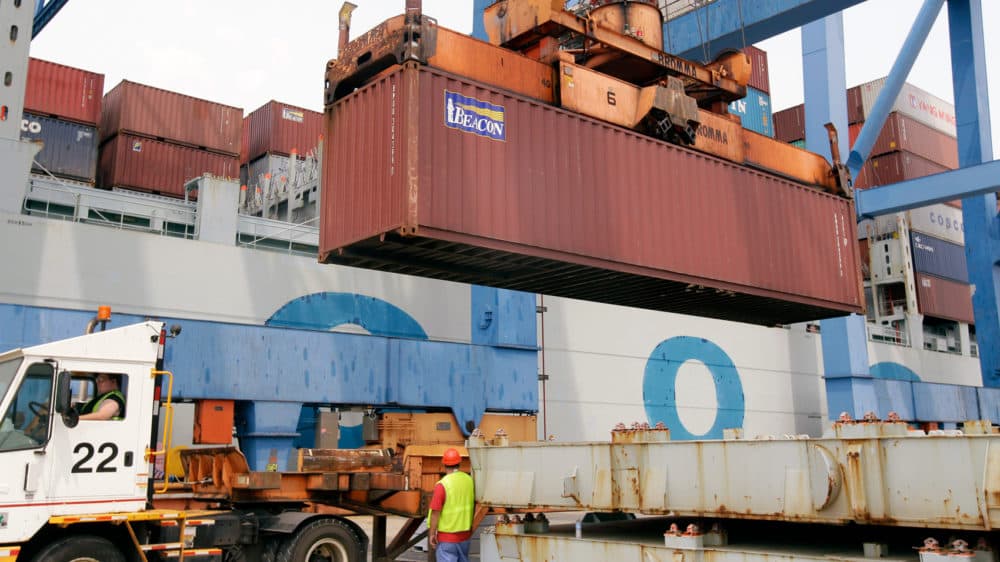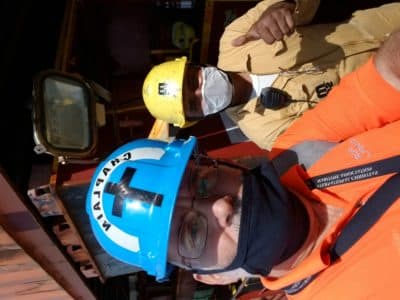Advertisement
For Seafaring Workers, The Pandemic Could Mean Even More Time Away From Home
Resume
Before the coronavirus pandemic, Rev. Steve Cushing used to visit with cargo ship workers on their container ships in Boston Harbor.
He runs the New England Seafarers Mission, a small service center operated by the Evangelical Covenant Church at the cruise terminal in South Boston. Cushing would board the ships to have coffee with the seafarers, talk about their life and provide them with SIM cards so they could access the internet from their ships.
But that's all changed.
Cargo ships still come in and out of Boston Harbor every week, although at a slower pace — Massport reports traffic at the Conley Container Terminal in South Boston has dropped about 25% compared to last year — and the cargo still gets unloaded and trucked out across the region. But new restrictions prohibit crew from leaving their ships.

So, Cushing developed a new system. He drives out to the terminal, dons a bright-colored vest and face mask, and then navigates his way to the docked ship.
"I stay out of the way of all the activity that’s going on," Cushing says. "If you’ve ever seen a video of a port, it’s pretty hectic. It’s kind of like a real life video game. So you just stay out of the way as much as possible."
He then climbs the ship's gangway with a bag full of SIM cards, newspapers and small gifts.
"I think I counted it once, it’s about 35 steps or something like that, and depending on the tide it can be at a pretty steep angle or low angle," he says. "At the top of the gangway, I introduce myself to the man who’s on watch, tell them I’m from the seafarers' center [and ask], is there anyone who needs anything that’s on board the ship," he says.
These visits are much briefer: a hand-off and a kind word before setting off. Even so, Cushing says he finds the work rewarding.
"[These seafarers] are pretty much off-the-radar," he says. "They need to have some kind of a contact with society back home — and if what society is providing is a way for them to contact their family, they need that. They need to know that somebody is listening, and that’s where we come in, even if it is a small number of people."
And the SIM cards he provides are important to crew members, especially during the coronavirus pandemic. Take it from Van Henrich Dahilig. He's a marine engineer from the Philippines, who's worked on shipping routes all over the world, from New England to the Baltic Sea.
"Internet is the most needed thing on the ship," he says. "Because you’re far away from your family. You need to update them, you need to know what are they doing, how’s their condition."
"Internet is the best thing that’s happened to the shipping."
"I’m so afraid to touch [my family] because nobody knows. We cannot see our enemies. It’s very heartbreaking."
Van Henrich Dahilig, Marine Engineer
Until a few weeks ago, Dahilig was working on an oil tanker in the Mediterranean. Now, he’s back home in the Philippines. When WBUR reached Dahilig over Zoom, he was finishing his 14-day home quarantine in Lucban, a leafy city nestled under Mount Banahaw.
Dahilig had been longing to see his wife and 3-year-old son, who for the past year he’d only seen over grainy video calls at sea. But he worried he could be carrying the coronavirus from his trip back home from the capital Manila, where he disembarked.
"I’m so afraid to touch them because nobody knows. We cannot see our enemies. It’s very heartbreaking. It’s like my heart is being crushed, seeing my wife and kid in front of me," he said. "But what can I do?"
Dahilig is used to the seafarers’ lifestyle — months at sea, punctuated by short stints at home. He’s worked on ships for the past 12 years, and his father was a waiter on a cruise ship. But his last journey was different.
Dahilig was scheduled to leave his ship in December. But the person assigned to relieve him wasn’t available until February, so he had to stay. When he finally got a plane ticket home, the Philippines banned incoming flights from the region because of the coronavirus outbreak.
Dahilig ended up serving 14 months on board — almost double the length of a typical contract. His situation isn’t unique. Seafarers all over the world are going through the same ordeal because of the outbreak.
"In your mind, to help you get through all those difficult conditions, you can’t help but look ahead to the date that you’re due to go home. And so to be on board and to suddenly be delayed is difficult in itself."
Helen Sampson, director, Seafarers International Resource Centre at Cardiff University
"It’s quite hard for crew companies and crew managers to organize crew changes at the best of times," said Helen Sampson, the director of the Seafarers International Resource Centre at Cardiff University. "So on top of these kinds of logistical problems, they also have the problem of what crew are available, who’s well ... and who’s not a threat to others on board the ship."
"And that’s a problem because if they can’t find a reliever for you, you might be calling at a port where you’re allowed to leave, but the company may have to turn around and say, 'sorry ... we can't possibly sail the ship without you, so you’re going to have to stay on board'," she said. "And psychologically I think that’d be an absolute nightmare."
Sampson says the coronavirus pandemic has made an already challenging life even more stressful.
"Cargo ships in particular are pretty difficult working environments," she said. "They’re very monotonous, totally institutionalized ... and in your mind, to help you get through all those difficult conditions, you can’t help but look ahead to the date that you’re due to go home. And so to be on board and to suddenly be delayed is difficult in itself."
Though exact numbers are hard to find, the International Chamber of Shipping estimated in May that as many as 200,000 seafarers could be caught in this situation, stuck on their ships indefinitely, without relief.
As for Van Henrich Dahilig, in the Philippines, he says he may never go back to sea after his last experience.
He's worked on ships his whole adult life, like his father. But he's not sure he wants his son to follow in his footsteps.
"I don’t want him to be the same job as me," he said. "I want him to be a pilot, a doctor, whatever he likes. If you have a choice, choose the other side, choose the other path.
"Our seafarers, these women and men who go through a lot of stress and anguish and separation so that our world can operate ... they sacrifice a lot so that you and I can enjoy the things that we enjoy."
Rev. Steve Cushing
Back in Boston, Rev. Steve Cushing delivers a few SIM cards to a seafarer at the Conley Container Terminal. The crew member thanks him, and Cushing tells him he hopes he can get home soon, before they head separate ways on the gangplank.
Cushing says he’ll keep making these trips every week, until the pandemic is over.
"Our seafarers, these women and men who go through a lot of stress and anguish and separation so that our world can operate ... they sacrifice a lot so that you and I can enjoy the things that we enjoy," he says. "And I am mandated as a minister in the Christian church to welcome them with whatever resources I have and enable them on their journey until they leave."
This segment aired on July 9, 2020.
